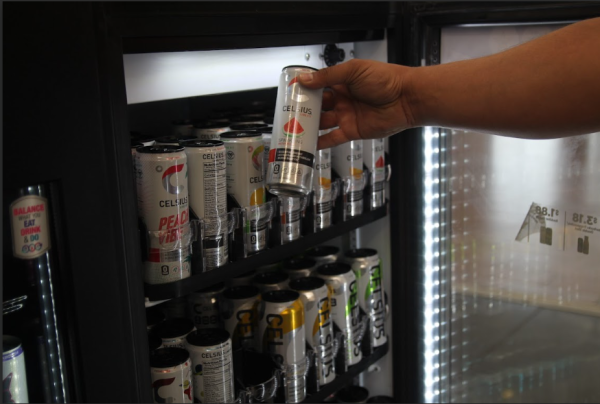
Walking through the halls of East, it can be impossible not to notice the copious amounts of energy drinks clutched in the hands of students. These days it can seem unfeasible to feel satiated with the amount of sleep that we get. Between staying up late to finish an assignment and wanting just a few more minutes scrolling through social media, many teens do not sleep until well into the night. If that’s the case, what’s the harm in having a little pick-me-up when feeling tired?
That brings into account the question of what we’re actually consuming. How often do you stop to check the label of what you’re drinking? Something that promises to “boost metabolism” and provide “essential energy” must be healthy, right?
This, however, is not always the case. Because teens are more sensitive to caffeine than adults, their max daily caffeine intake should not exceed 100 milligrams, compared to an adult’s intake of 400. Most energy drinks contain heavy amounts of caffeine, and also use other stimulants to further give that “caffeine rush” that many crave.
Examples of these other stimulants include guarana and ginseng. Alone, these might not do much for someone, but added together with caffeine can have a strong effect. Guarana has a caffeine-like effect on the heart, vasculature and central nervous system. It can cause insomnia, stomach irritation, vomiting and other side effects. Excessive amounts of ginseng are not recommended as it can cause nervousness, insomnia, changes in blood pressure and mania.
Despite this, many still continue to drink these energy drinks. Sophomore Meredith Caldwell recently gave up her drink of choice, Celsius. She explains why she decided to quit, stating that she gave it up for lent because of the negative effect that she believed it had on her.
“Whenever I drank one in the morning, they kept me up late,” Caldwell said. “They’re so packed with energy and I felt like I was bouncing off the walls more than I normally am.”
Many are not aware of the fact that Celsius is actually banned by the National Collegiate Athletics Association (NCAA) because it contains ginseng, guarana, L-carnitine and taurine, all of which are currently banned by the NCAA.
L-carnitine is a chemical that is made in the brain, liver, and kidneys. It helps the body turn fat into energy. This should not be taken in excess however, because it can cause nausea, vomiting, abdominal cramps and other side effects. Taurine is a type of chemical that occurs naturally in the body. It is commonly used to help fatigue, diabetes and obesity, but there is not much strong scientific evidence to support these uses.
Coffee is generally seen as the healthier alternative to energy drinks, as it’s a natural, plant-derived food, containing no sugar. One of the things that can be harmful about energy drinks is the amount of sugar that is contained in them. Drinking them consistently contributes to plaque formation, promoting tooth decay. Additionally, because energy drinks are acidic, they can discolor your teeth and wear out your tooth enamel.
Sophomore Alex Nguyen regularly drinks Celsius, and doesn’t believe he can get through the day without one. This caught up to him when he tried to donate blood, and wasn’t able to.
“I tried to donate blood the other day and they told me that my heart rate was too high to donate, and I was wondering why, but I literally had a Celsius in my hand,” Nguyen said.









Isabela Zapata Duque • May 19, 2025 at 9:51 am
I agree Celsius energy drinks help to have better energy during class, so it makes students focus more on their assignments, also helps if students does not have a better amount to sleep last night, but it is true that students should to be careful and do not drink Celsius every day because their health may be affected because of the caffeine and other ingredients that those drinks may have.